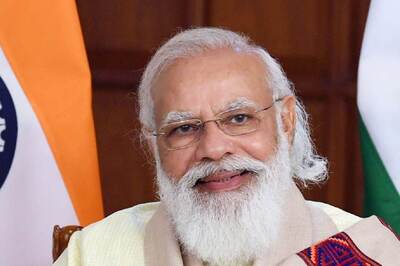
views
Sanaa: Hundreds of thousands of anti-government protesters packed the streets of several Yemeni cities on Wednesday to demand the president's ouster and denounce a munitions factory blast that left at least 100 people dead.
Opposition groups have accused President Ali Abdullah Saleh of collaborating with al-Qaida militants by pulling back the army from the factory area and allowing the terror network to overrun the area.
"Without this organised pull out and the planned chaos by the regime, the massacre at the factory would have not happened," a statement said.
Saleh has cooperated closely with the US in the battle against Yemen's branch of al-Qaida, which has used areas of Yemen long out of state control to launch attacks including the attempt to bomb a Detroit-bound airliner with a bomb sewn into underwear.
But the president has also battled regional rebellions in the north and south, and the opposition accuses him of exploiting Western fears that al-Qaida could rise to fill a vacuum if he were ousted.
Youssef Said, a leader in Saleh's ruling Congress Party and a professor at Aden University, denied the allegations. "These accusations are false and are part of the opposition's political maneuvering," he said.
Opposition spokesman Mohammed al-Sabri also criticised remarks by US Defence Secretary Robert Gates on ABC News’ "This Week" in which he said the fall of Saleh's regime could pose a "real problem" for America.
"The remarks are clear indications that the US administration stands by Saleh who gave al-Qaida elements a green light to create chaos in the south to scare the Americans," the opposition spokesman said on Wednesday.
State control in Yemen has diminished sharply this month as massive demonstrations spiraled in major cities and the government pulled police from many towns, and anti-government protesters in other areas pushed out police and soldiers and set up militias for self-defense.
The protesters blame Saleh for mismanagement, repression and the fatal shootings of protesters, and say they will not relent until he goes.
Still, a senior opposition member promised that if Saleh stepped down, he would be treated well a gesture that offered hopes that despite the hardened stances of both sides, there may still be room to maneuver a solution to the political crisis.
Sheik Sadeq al-Ahmar, leader of Yemen's most powerful tribe, Hashid, to which Saleh himself belongs, told US ambassador to Yemen, Gerald Feierstein, that he would guarantee "a safe and honorable departure from power of Saleh provided that there would be no bloodshed."
Al-Ahmar's spokesman, Abdel-Qawi al-Qaisi, said the sheik who has defected to the opposition assured the ambassador during their meeting on Monday that changes in Yemen would be in line with the aspirations of the youths and the demands of the political parties.
Anti-government protests resumed on Wednesday in Sanaa as well as Saada, where Shiite rebels have fought Saleh's forces for years, and Marib, an al-Qaida stronghold and one of several areas where the central government has little authority.
Saleh's stay in power "constitutes a grave danger to Yemen and its people and endangers the region's security and stability," the opposition statement said.
Monday's explosion was apparently set off accidentally after armed men described by residents as religious extremists seized the factory and nearby towns in the mountains southern province of Abyan, where al-Qaida has been active.
The militants reportedly took two armored cars, a tank, several pickup trucks mounted with machine guns and ammunition. Later, dozens of impoverished men, women and children entered the facility and looted anything of valued that remained, including cables, doors and vehicle fuel, according to witnesses.
Residents said later that someone may have dropped a lit cigarette next to explosives at the site.
The Interior Ministry said at least 100 people were killed and 80 injured in the explosion.
Abyan province's deputy governor, Saleh al-Shamsi, told The Associated Press on Wednesday that the armed men were "elements belonging to Sanaa and got their orders from there."
Meanwhile, the head of Yemen's Association for Democratic Freedoms and Human Rights, Seif Ali Hassan, expressed concern about the fate of 77 activists who have been detained incommunicado 14 in Aden and 63 in Sanaa for more than two weeks.



















Comments
0 comment